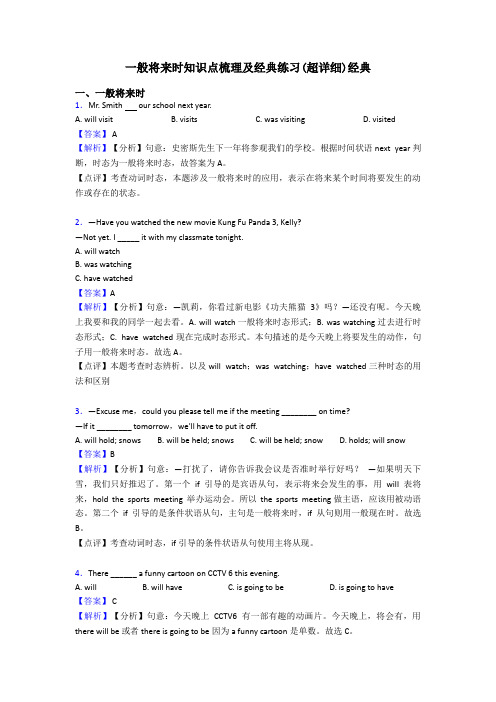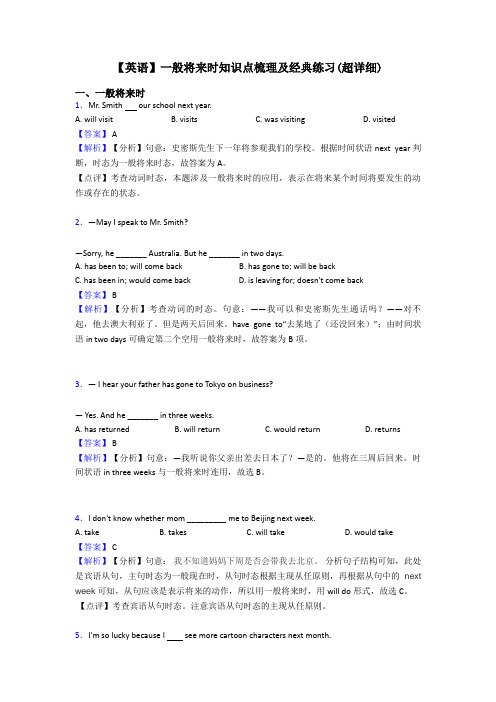初中一般将来时知识总结及练习
一般将来时知识点梳理及经典练习(超详细)经典

一般将来时知识点梳理及经典练习(超详细)经典一、一般将来时1.Mr. Smith our school next year.A. will visitB. visitsC. was visitingD. visited【答案】 A【解析】【分析】句意:史密斯先生下一年将参观我们的学校。
根据时间状语next year判断,时态为一般将来时态,故答案为A。
【点评】考查动词时态,本题涉及一般将来时的应用,表示在将来某个时间将要发生的动作或存在的状态。
2.—Have you watched the new movie Kung Fu Panda 3, Kelly?—Not yet. I _____ it with my classmate tonight.A. will watchB. was watchingC. have watched【答案】A【解析】【分析】句意:—凯莉,你看过新电影《功夫熊猫3》吗?—还没有呢。
今天晚上我要和我的同学一起去看。
A. will watch一般将来时态形式;B. was watching过去进行时态形式;C. have watched现在完成时态形式。
本句描述的是今天晚上将要发生的动作,句子用一般将来时态。
故选A。
【点评】本题考查时态辨析。
以及will watch;was watching;have watched三种时态的用法和区别3.—Excuse me,could you please tell me if the meeting ________ on time?—If it ________ tomorrow,we'll have to put it off.A. will hold; snowsB. will be held; snowsC. will be held; snowD. holds; will snow 【答案】B【解析】【分析】句意:—打扰了,请你告诉我会议是否准时举行好吗?—如果明天下雪,我们只好推迟了。
一般将来时知识点总结及经典习题(含答案)

译林版中考英语九年级英语一般将来时知识点总结及经典习题(含答案)一、初中英语一般将来时1.We____ shopping unless it ____ tomorrow.A. will go, will rainB. go, will rainC. will go, rainsD. go, rains【答案】C【解析】【分析】句意:除非明天下雨,否则我们将会去购物。
unless 除非,引导条件状语从句,从句中应该用一般现在时表示将来,主句用一般将来时。
故应选C。
【点评】考查动词时态。
2.I don't know whether mom _________ me to Beijing next week.A. takeB. takesC. will takeD. would take【答案】 C【解析】【分析】句意:我不知道妈妈下周是否会带我去北京。
分析句子结构可知,此处是宾语从句,主句时态为一般现在时,从句时态根据主现从任原则,再根据从句中的next week可知,从句应该是表示将来的动作,所以用一般将来时,用will do形式,故选C。
【点评】考查宾语从句时态。
注意宾语从句时态的主现从任原则。
3.—Do you know when Mrs. White for dinner this evening?—No, but I think she when she is free.A. will come; will comeB. will come; comesC. comes; will come【答案】 A【解析】【分析】句意:——你知道怀特太太今晚是否来吃晚饭吗?——不知道。
但我认为如果她有空,她会来。
空一,句子为含有宾语从句的主从复合句,主句是一般现在时,从句用它所需要的任何时态,根据this evening今晚,可知句子为一般将来时,will come;空二,回答是when引导的时间状语从句,从句是一般现在时,主句应用将来时,will come,故选A。
【英语】一般将来时知识点梳理及经典练习(超详细)

【英语】一般将来时知识点梳理及经典练习(超详细)一、一般将来时1.Mr. Smith our school next year.A. will visitB. visitsC. was visitingD. visited【答案】 A【解析】【分析】句意:史密斯先生下一年将参观我们的学校。
根据时间状语next year判断,时态为一般将来时态,故答案为A。
【点评】考查动词时态,本题涉及一般将来时的应用,表示在将来某个时间将要发生的动作或存在的状态。
2.—May I speak to Mr. Smith?—Sorry, he _______ Australia. But he _______ in two days.A. has been to; will come backB. has gone to; will be backC. has been in; would come backD. is leaving for; doesn't come back【答案】 B【解析】【分析】考查动词的时态。
句意:——我可以和史密斯先生通话吗?——对不起,他去澳大利亚了。
但是两天后回来。
have gone to“去某地了(还没回来)”;由时间状语in two days可确定第二个空用一般将来时,故答案为B项。
3.— I hear your father has gone to Tokyo on business?— Yes. And he _______ in three weeks.A. has returnedB. will returnC. would returnD. returns【答案】 B【解析】【分析】句意:—我听说你父亲出差去日本了?—是的。
他将在三周后回来。
时间状语in three weeks与一般将来时连用,故选B。
4.I don't know whether mom _________ me to Beijing next week.A. takeB. takesC. will takeD. would take【答案】 C【解析】【分析】句意:我不知道妈妈下周是否会带我去北京。
一般将来时(知识梳理+真题+练习)

一般将来时(知识梳理+真题+练习)知识梳理1、定义:表示将要发生的动作或存在的状态,以及打算,计划或准备某事,句中一般含有表示将2、构成:①be going to+动词原形如:Iam going to see a Beijing opera tomorrow.We are going to meet at bus stop at half past ten.Dad and I are going to see a Beijing opera this afternoon.②will+动词原形如:They will go swimming this afternoon.3:be going to和will区别:①be going to表示经过事先安排,打算和决定要做的事情,基本上一定会发生;will则表示有可能去做,但不一定发生,也常表示说话人的临时决定。
②be going to表示近期或眼下就要发生的事情;will表示将来的时间则较远一些。
如:He is going to write a letter tomorrow.I will meet her one day.③be going to还可以用来表示有迹象表明某件事情将要发生,常用于天气等自然现象。
如:Look!It's going to rain.4、一般将来时句型转换:名校真题体验1.Li Yuan_____12 years old tomorrow.(长春市某中学招生入学考试真题)A. is going toB. will beC. isD. was解析:由tomorrow (明天)可知词句时态为一般将来时时,故选B2.Jack _________back home tomorrow.A. is going to beB. beC. was解析:由tomorrow (明天)可知词句时态为一般将来时时,故选A。
(济南市某重点中学入学试题)习题练习1.My aunt ________(come)back tomorrow . We are very excited .2.She will ________(visit) her uncle next week.3.What are you going________(do) there?4.They ________(plant) trees tomorrow.5.—________ Timmy ________(visit) his friends next Sunday? —Yes, he is.6.Tom ________ (go) to plant trees next day. He ________ (go) to plant trees every year.7.He________(visit) the farm next week.语法及练习6 将来时将来时一、概念:表示将要发生的动作或存在的状态及打算、计划或准备做某事。
七年级下册一般将来时复习讲解与练习

感谢您的观看
THANKS
七年级下册一般将来时 复习讲解与练习
目录 CONTENT
• 一般将来时的基本概念 • 一般将来时的语境与运用 • 一般将来时的练习与巩固 • 常见错误与纠正方法 • 一般将来时与其他时态的比较 • 综合练习与测试
01
一般将来时的基本概念
定义与用法
定义
一般将来时是表示将来某个时间将要 发生的动作或存在的状态,常与表示 将来的时间状语连用,如tomorrow 、next week等。
总结词:提高运用能力
在此添加您的文本16字
详细描述:通过填空练习,让学生在实际语境中运用一般 将来时,提高语言运用能力和语境理解能力。
在此添加您的文本16字
总结词:拓展词汇和表达方式
在此添加您的文本16字
详细描述:在填空练习中,可以加入一些常用词汇和表达 方式,帮助学生拓展语言知识,提高语言表达能力。
综合写作练习
总结词
提升写作水平
详细描述
通过写作练习,让学生在实际写作中运用一般 将来时,提高写作水平和表达能力。
总结词
培养逻辑思维能力
详细描述
在写作练习中,可以引导学生思考和组织语言,培 养逻辑思维能力,提高写作质量。
总结词
促进语言实际运用能力
详细描述
写作练习可以让学生在实践中运用语言,提高实际运用 能力和跨文化交流能力。
与过去时区分
过去时表示已经发生的事情,而一般将来时表示尚未发生的事情。例如,“我昨 天去了超市”应该使用过去
03
一般将来时的练习与巩固
填空练习
总结词
填空练习是巩固一般将来时的有效方法,通过填空练习,学生可以加深对一般将来时态的理解和运用 。
中考(一般将来时)

备战2024年中考【语法考点梳理+真题必刷】一般将来时Part1 考点梳理(一)一般将来时基本概念一般将来时表示将来某一时刻的动作或状态,或将来某一段时间内经常的动作或状态。
I wonder what you are going to do this summer.我想知道你今年暑假打算做什么。
If you play football well enough, you’ll be accepted by the school football team.如果你踢得足够好,你就会被学校足球队录取。
(二)句型结构:A:肯定句:主语+ will +V原形/be going to +V原形+其他He will be a college student in 3 years. 三年后他将成为一名大学生。
He is going to move to Beijing in two months.他将在两个月后搬到北京。
B:否定句:主语+ won’t+V原形/be(am/is/are) not going to +V原形+其他He won’t come here in two hours.他两小时内不会来这里。
They aren’t going to do their homework tonight.他们今晚不打算做家庭作业。
C:一般疑问句:Will +主语/Be+主语+going to +V原形+其他?Will he solve his problems by himself? 他会自己解决问题吗?’Are you going to travel in China in two months? 两个月后你打算去中国旅行吗?(三)时间状语:(四)will和be going to 的区别①be going to 表示近期、眼下就要发生的事情(较近将来)will 表示的将来时间则较远一些。
(较远将来)Are you going to visit your grandma this Saturday?这个星期六你打算去看望你奶奶吗?I will pay the money back in five years.我会在五年后还钱。
初中英语主要时态系列——一般将来时讲解及练习【附中考真题及解析】
初中英语主要时态系列——一般将来时讲解及练习【附中考真题及解析】1一般将来时的含义一般将来时表示将来某个时间要发生的动作或状态,或将来经常发生的动作或状态。
2一般将来时的基本结构1. will/shall+动词原形will 在陈述句中用于各种人称;shall用于第一人称,常被will 所代替。
否定式:will not=won't;shall not=shan't一般疑问式:will/shall+主语+动词原形+其他?特殊疑问式:特殊疑问词+一般疑问式?I will/shall do a better job next time. 下次我要做得好些。
Oil and water will not mix. 油和水没法混在一起。
—Will he help you with your English tonight? 今天晚上他会帮助你学习英语吗?—Yes, he will./No, he won't. 是的,他会。
/不,他不会。
—When will you arrive for America? 你什么时候去美国?—Tomorrow. 明天。
2. am/is/are going to +动词原形否定式:am/is/are not going to +动词原形一般疑问式:am/is/are +主语+ going to + 动词原形+其他?特殊疑问式:特殊疑问词+一般疑问式?He is going to spend his holidays in London. 他打算在伦敦度假。
Look at the dark clouds. There is going to be a storm. 看那乌云,快要下雨了。
Is he going to collect any data for us? 他会帮我们收集数据吗?What are you going to do tomorrow? 明天你打算作什么?3一般将来时的用法will+动词原形与am/is/are going to +动词原形的用法虽然都表示将来发生动作或情况,一般情况下能互换。
初中英语一般将来时讲解与练习(含答案)
一般将来时讲解与练习一、概念:一般将来时表示将来某个时间要发生的动作或存在的状态,及计划、打算或准备做某事。
常常与表示将来的时间状语连用。
如:tomorrow,next day(week, month, year…),soon,the day after tomorrow(后天)等。
二、常用的表达形式共有五种,现归纳如下:(一)“will +动词原形”这一形式,主要用于在以下几个方面:1、表示单纯的未来“将要”通用于各个人称。
eg:They will go to visit the factory tomorrow. 明天他们将去工厂参观。
I’ll come with Wang Bing and Yang Ling. 我将和王兵、杨玲一起来。
The rain will stop soon. 雨很快就要停了。
2、表示不以人的意志为转移的自然发展的未来的事。
eg:Today is Saturday. Tomorrow will be Sunday. 今天是星期六。
明天是(将)是星期日。
He will be thirty years old this time next year. 明年这个时候他就(将)三十岁。
3、问对方是否愿意做某事或表示客气地邀请或命令。
eg: Will you please turn on the radio? 请打开收音机好吗?Will you go to the zoo with me? 你和我一起去动物园好吗?Shall we go there at five? 我们五点钟去那儿,好吗?Will you please open the door? 请你把门打开,好吗?注:在口语中will用于所有人称,书面语中第一人称常用shall。
(二)“be going to+动词原形”的形式,表示事先经过考虑、安排好打算、计划要做的事情以及已有迹象表明必将发生某事,意为“打算;就要”。
初二英语一般将来时讲解及练习
初二英语一般将来时讲解及练习讲解一般将来时表示将来某个时间或某个动作或状态一定会发生或存在的情况。
在英语中,一般将来时的构成主要有两种形式:will/shall + 动词原形和be going to + 动词原形。
will/shall + 动词原形will/shall + 动词原形是一般将来时的最基本形式。
其中,will通常用于第一人称,shall通常用于第二和第三人称。
例如:I will go to the party tomorrow.(我明天去参加聚会。
)He will finish his homework after dinner.(他晚饭后完成他的作业。
)They will have a picnic in the park next weekend.(他们下周末在公园野餐。
)be going to + 动词原形be going to + 动词原形表示将要发生或存在的事情,通常用于未来的计划、意图或打算。
例如:I am going to study abroad next year.(我明年要去留学。
)She is going to visit her grandparents this weekend.(她这个周末要去看她的祖父母。
)We are going to have a meeting next week.(我们下周要开会。
)注意:在使用be going to + 动词原形时,要注意主语和be动词之间的一致性。
例如:He is going to play football.(他将要去踢足球。
)而不能说:He are going to play football.练习题一、用一般将来时填空I (visit) my grandparents next weekend.They (have) a party next Saturday.He (be) a doctor when he grows up.We (travel) to Europe next summer.She (write) a novel someday.They (move) to a new house next month.I (study) hard so I can get into a good college. He (play) the piano at the concert next week. We (have) a meeting tomorrow morning. She (graduate) from high school in two years.二、将下列句子变为一般将来时I study English every day. _She teaches math at the high school.They are going to the movies tonight.He likes to read books in his free time. ___ We have dinner at six o'clock every evening. _ The train arrives at 8:00 in the morning. __ She sings in the choir on Sundays.They play soccer after school. ___He works at a restaurant on weekends. ____ We visit our grandparents once a month. __ 三、用一般将来时完成下列对话A: What are you going to do this weekend? B: I'm going to visit my grandparents.A: That sounds nice. Where do they live?B: They live in the countryside.A: What are you going to do there?B: We're going to have a picnic and go fishing.A: That sounds like fun. Are you going with your parents?B: Yes, my parents and my younger brother are coming too.A: Have a great time!B: Thank you, we will!四、阅读理解My Future PlansMy name is Jack and I'm a sophomore in high school. I have a lot of plans for my future. First of all, I want to go to a good college and study business. I have always been interested in business and I think I would be good at it. After graduation, I plan to start my own business.I want to own a restaurant that serves healthy and delicious food.In order to achieve my goals, I need to work hard in school and get good grades. I also need to learn about managing money and running a business. I have been studying these topics on my own and I plan to take some courses in college.I know it won't be easy, but I'm determined to succeed. I believe that if I work hard and stay focused, I can achieve anything I want.What does Jack want to study in college?What does Jack plan to do after graduation?What kind of restaurant does Jack want to own?What does Jack need to do in order to achieve his goals?What does Jack believe?答案:Jack wants to study business in college.Jack plans to start his own business after graduation.Jack wants to own a restaurant that serves healthy and delicious food.Jack needs to work hard in school, get good grades, learn about managing money and running a business, and take courses in college.Jack believes that if he works hard and stays focused, he can achieve anything he wants.。
一般将来时讲解(附习题+答案)
一般将来时讲解(附习题+答案)一、一般将来时的含义:表示动作发生在将来二、一般将来时的句型:(1) will/shall+动词原形(2) be going to+动词原形三、一般将来时的时间状语:tomorrow(明天)、the day after tomorrow(后天)、next...(下一...): next week(下一周)、next year(明年)、next month(下个月)in+一段时间(...之后): in three days(三天之后)、in the future在未来this evening(今天晚上)四、一般将来时的句型结构:(1) will/shall+动词原形(will not =won’t)(will 各种人称均可用,shall 只能用于第一人称)1)肯定句:主语+will/shall+动词原型...如:I will go to school tomorrow.我明天将会去学校He will go to school tomorrow.他明天将会去学校。
2)否定句:主语+will/shall+not+动词原型...如:I won’t go to school tomorrow.我明天将不会去学校。
He won’t go to school tomorrow.他明天将不会去学校。
3)一般疑问句:Will/Shall +主语+动词原型...如:Will you go to school tomorrow?你明天要去学校吗?Will he go to school tomorrow?他明天要去学校吗?肯定回答:Yes, 主语+will.如:Yes, I will.Yes, he will.否定回答:No,主语+will+not.如:No, I won’t.No, he won’t.4) 特殊疑问句:特殊疑问词+will/shall+主语+动词原型...如:What will you do tomorrow?你明天将会做什么?What will he do tomorrow?他明天将会做什么?(2) be going to+动词原形1)肯定句:主语+be going to +动词原型...如:I am going to buy some books tomorrow.我明天打算去买一些书。
- 1、下载文档前请自行甄别文档内容的完整性,平台不提供额外的编辑、内容补充、找答案等附加服务。
- 2、"仅部分预览"的文档,不可在线预览部分如存在完整性等问题,可反馈申请退款(可完整预览的文档不适用该条件!)。
- 3、如文档侵犯您的权益,请联系客服反馈,我们会尽快为您处理(人工客服工作时间:9:00-18:30)。
初中一般将来时知识总结及练习(含答案)一般将来时1.用be doing表示将来:主要意义是表示按计划、安排即将发生的动作,常用于位置转移的动词。
如:go,come,leave,arrive等,也可用于其他动作动词。
We are having fish for dinner.We are moving to a different hotel the day after tomorrow.这种用法通常带有表示将来的时间状语,如果不带时间状语,则根据上下文可表示最近即将发生的动作。
A: Where are you going? B: I am going for a walk. Are you coming with me?A: Yes,I am just coming. Wait for me.2.用be going to do表示将来:主要意义,一是表示“意图”,即打算在最近的将来或将来进行某事。
Are you going to post that letter?How long is he going to stay here?I am going to book a ticket.另一意义是表示“预见”,即现在已有迹象表明将要发生或即将发生某种情况。
It’s going to rain.George is putting on weight; he is going to be quite fat.3. 用will/ shall do表示将来:一是表示预见You will feel better after taking this medicine.Do you think it will rain?二是表示意图.I will not lend the book to you.Take it easy,I will not do it any longer.基本结构:She will come to have class tomorrow.Will she come to have class tomorrow?She won’t come to have class tomorrow.What will she do tomorrow?肯定形式:①am/is/are going to + do;②will/shall + do.否定形式:①am/is/are going not to + do;②will/shall not + do.一般将来时练习一、用所给动词的一般将来时填空1. I ______(leave)in a minute. I ______(finish)all my work before I ______ (leave).2. —How long _____ you _____(study)in our country?—I _____(plan)to be here for about one more year.—I _____(hope)to visit the other parts of your country. —What ______ you ______(do)after you ______(leave)here? —I ______(return)home and ______(get)a job.3. I ______(be)tired. I ______(go)to bed early tonight.4. Mary’s birthday is next Monday, her mother _____(give)her a present.5. It is very cold these days. It ______(snow)soon.6. —_____ you _____(be)here this Saturday?—No. I ______(visit)my teacher.7. —______ I ______(get)you a copy of today’s news paper? —Thank you.8. I am afraid there ______(be)a meeting this afternoon. I can’t join you.9. Mike ______(believe, not)this until he ______(see)it with his own eyes.10. Most of us don’t think their team ______(win).二、单项选择1. There __________ a meeting tomorrow afternoon.A. will be going toB. will going to beC. is going to beD. will go to be2. Charlie ________ here next month.A. isn’t workingB. doesn’t workingC. isn’t going to workingD. won’t work3. He ________ very busy this week, he ________ free next week.A. will be; isB. is; isC. will be; will beD. is; will be4. There ________ a dolphin show in the zoo tomorrow evening.A. wasB. is going to haveC. will haveD. is going to be5. –________ you ________ free tomorrow?– No. I ________ free the day after tomorrow.A. Are; going to; willB. Are; going to be; willC. Are; going to; will beD. Are; going to be; will be6. Mother ________ me a nice present on my next birthday.A. will givesB. will giveC. givesD. give7. – Shall I buy a cup of tea for you?–________. (不,不要。
)A. No, you won’tB. No, you aren’t.C. No, please don’tD. No, please.8. – Where is the morning paper?– I ________ if for you at once.A. getB. am gettingC. to getD. will get9. ________ a concert next Saturday?A. There will beB. Will there beC. There can beD. There are10. If they come, we ________ a meeting.A. haveB. will haveC. hadD. would have11. He ________ her a beautiful hat on her next birthday.A. givesB. gaveC. will givingD. is going to giving12. He ________ to us as soon as he gets there.A. writesB. has writtenC. will writeD. wrote13. He ________ in three days.A. coming backB. came backC. will come backD. is going to coming back14. If it ________ tomorrow, we’ll go roller-skating.A. isn’t rainB. won’t rainC. doesn’t rainD. doesn’t fine15. – Will his parents go to see the Terra Cotta Warriors tomorrow?– No, ________ (不去).A. they willn’tB. they won’t.C. they aren’tD. they don’t.16. Who ________ we ________ swimming with tomorrow afternoon?A. will; goB. do; goC. will; goingD. shall; go17. We ________ the work this way next time.A. doB. will doC. going to doD. will doing18. Tomorrow he ________ a kite in the open air first, and then________ boating in the park.A. will fly; will goB. will fly; goesC. is going to fly; will goesD. flies; willgo19. The day after tomorrow they ________ a volleyball match.A. will watchingB. watchesC. is watchingD. is going to watch20. There ________ a birthday party this Sunday.A. shall beB. willbe C. shall going to be D. will going to be21. They ________ an English evening next Sunday.A. are havingB. are going to haveC. will havingD. is going to have22. ________ you ________ free next Sunday?A. Will; areB. Will; beC. Do; beD. Are; be23. He ________ there at ten tomorrow morning.A. willB. isC. will beD. be24. ________ your brother ________ a magazine from the library?A. Are; going to borrowB. Is; going to borrowC. Will; borrowsD. Are; going to borrows 25. – Shall I come again tomorrow afternoon?–________ (好的).A. Yes, pleaseB. Yes, you will.C. No, pleaseD. No, you won’t.26. It ________ the year of the horse next year.A. is going to beB. is going toC. will beD. will is27. ________ open the window?A. Will you pleaseB. Please will youC. You pleaseD. Do you28. –Let’s go out to play football, shall we?– OK. I ________.A. will comingB. be going to comeC. comeD. am coming29. It ________ us a long time to learn English well.A. takesB. will takeC. spendsD. will spend30. The train ________ at 11.A. going to arriveB. will be arriveC. is going toD. is arriving三、把下列各句译成英语1.我叔叔今晚要来。
